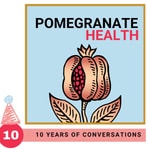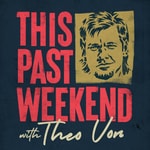Pomegranate Health – Details, episodes & analysis
Podcast details
Technical and general information from the podcast's RSS feed.

Pomegranate Health
the Royal Australasian College of Physicians
Frequency: 1 episode/28d. Total Eps: 132

Pomegranate Health is a podcast about the culture of medicine. You'll hear insights from clinicians, researchers, and advocates as they tackle important questions — like how to make difficult clinical and ethical decisions without being influenced by bias, how to communicate better with patients and colleagues, and how to provide healthcare that’s both efficient and fair.
If you're a Fellow of the RACP, time spent listening can be counted toward your CPD hours. And if you're a Basic Physician Trainee, the [Case Report] series can help you prepare for your long case clinical exams.
This is also the home of [IMJ On-Air], featuring authors from the Internal Medicine Journal sharing their latest research. The [Journal Club] episodes give RACP researchers a space to talk through their work published in other academic journals. And for Basic Trainees, the [Case Report] series can help you prepare for your long case clinical exams.
Find out more at the website www.racp.edu.au/podcast and get in touch via the address podcast@racp.edu.au
Recent rankings
Latest chart positions across Apple Podcasts and Spotify rankings.
Apple Podcasts
🇬🇧 Great Britain - medicine
17/07/2025#85
Spotify
No recent rankings available
Shared links between episodes and podcasts
Links found in episode descriptions and other podcasts that share them.
See all- https://www.epidemicsound.com/
2618 shares
- https://www.lifeline.org.au/
1688 shares
- https://www.epidemicsound.com
1122 shares
RSS feed quality and score
Technical evaluation of the podcast's RSS feed quality and structure.
See allScore global : 63%
Publication history
Monthly episode publishing history over the past years.
Ep132: Ten Years of Pomegranate Health
Episode 132
mardi 8 juillet 2025 • Duration 34:12
Pomegranate Health marks ten years of podcasting since its launch in June 2015. This episode will be one of two samplers that dip into the back catalogue of 131 episodes to showcase some of the most compelling stories. You’ll hear how podcast themes are identified from all the domains of medicine and professionalism. And a little bit about the motivations of long-time producer and presenter, Mic Cavazzini.
Pomegranate Health has several thousand listeners in over 150 countries. Three quarters of listeners are, predictably, in Australia and Aotearoa-New Zealand, but a full 14 per cent are located outside the traditional anglosphere. RACP is proud to provide this platform to showcase the great work and dedication of its members. It’s also a place where physicians can learn from the other professionals and patient advocates that make up the health system.
Sampled in this retrospective episode:
Prof Meera Agar from Ep22: Early days for medicinal cannabis
Dr Paul Drury and Prof Sophia Zoungas from Ep41: Targeting Diabetes
Prof Rinaldo Bellomo from Ep70: Zeroing in on “the renal troponin”
Dr Nic Szecket and Dr Art Nahill from Ep32: Cognitive biases in diagnostic thinking
Prof Ian Harris and Assoc Prof Louise Stone from Ep25: Dealing with Uncertainty Part 1
Dr Danielle Ofri from Ep38: Making a Connection
Michael Pooley as Dr David Hilfiker from Ep75: Feeling guilty- Medical Injury Part 2
Credits
Produced by Mic Cavazzini DPhil. Music licenced from Epidemic Sound includes ‘Le Hustle’ by Polyrhythmics, ‘Your Wave’ by Cospe, ‘Soul Single Serenade’ by Dusty Decks, ‘Hollow Head’ by Kenzo Almond and ‘Illusory Motion’ by Gavin Luke. Music courtesy of FreeMusicArchive includes ‘I got 99 broadswords but this one isn't one’ and ‘Friends’ by Komiku and ‘Cree’ by Satellite Ensemble. Thumbnail image is the copyright of RACP.
Editorial feedback kindly provided by RACP physicians Zac Fuller and Simeon Wong. Thanks also to RACP staff Kathryn Smith, Michael Davidson and Anne Fredrickson.
Please visit the Pomegranate Health web page for a list of thankyous over the ten years. Subscribe to new episode email alerts or search for ‘Pomegranate Health’ in Apple Podcasts, Spotify, Castbox or any podcasting app.
Ep131: The semantics of CPR
Episode 131
jeudi 19 juin 2025 • Duration 55:17
In this podcast we discuss low-value care that has emerged from a decay in the specificity of the terms “cardiac arrest” and “cardiopulmonary resuscitation.” Patients who experience cardiac arrest in hospital are rarely more than a minute or two away from defibrillation. But the proportion of shockable rhythms in these patients is low as the heart has typically stopped after the decline of other systems. In such conditions, chest compressions are more likely to cause unnecessary trauma than improve survival outcomes.
As retired UK palliative care physician Kathryn Mannix explains, “cardiac arrest” was originally reserved for unexpected events in relatively healthy individuals in the community. She says we need to separate this from the more progressive phenomenon that is better described as “natural dying”.
There is also a semantic breakdown in the understanding of what “cardiopulmonary resuscitation” entails. Surveys of Australasian medical practitioners show that the majority consider CPR to include defibrillation and drugs not just chest compressions and ventilation. As a result, Do Not Attempt CPR orders get perceived as being “a stop sign” to other treatments that may be beneficial. We hear from the NZ-based authors of that research, cardiologist Dr Tammy Pegg, intensivist Dr Alex Psirides and palliative care physician Dr Kate Grundy.
Chapters
4:00 CPR for out-of-hospital cardiac arrest
8:43 Overuse of CPR in hospitalised patients
20:08 Crude algorithms and failed conversations
40:17 Semantic confusion around what CPR entails
48:13 The midwifing of natural dying
Guests
Dr Kathryn Mannix (www.kathrynmannix.com)
Dr Tammy Pegg MRCP FRACP FC CANZ DPhil (Nelson Marlborough Hospital cardiology department)
Dr Alex Psirides FCICM (Wellington Regional Hospital intensive care unit)
Dr Kate Grundy FAChPM FRACP (Christchurch Hospital palliative care service; University of Otago)
Production
Produced by Mic Cavazzini DPhil. Music licenced from Epidemic Sound includes ‘Awash’ by Gavin Luke, ‘Fields 3’ by Gunnar Johnsén, ‘RGBA’ by Chill Cole and ‘Til All that’s Left is Ash’ by Ludlow.
Music courtesy of FreeMusicArchive includes ‘New Times’ by 4T Thieves and ‘Secret Place’ by Alex Fitch. Image by Yuichiro Chino licenced through Getty Images. Football commentary courtesy of UEFA Euro 2021.
Editorial feedback kindly provided by RACP physicians Stephen Bacchi, Fionnuala Fagan, Simeon Wong, Hugh Murray and Aidan Tan. Thanks also to RACP staff Arnika Martus and Kathryn Smith.
Please visit the Pomegranate Health web page for a transcript and supporting references. Login to MyCPD to record listening and reading as a prefilled learning activity. Subscribe to new episode email alerts or search for ‘Pomegranate Health’ in
Ep122: Funding pan-cancer therapies
Episode 122
mardi 28 janvier 2025 • Duration 50:05
In the previous episode we heard how some rationally-designed therapies work on almost any cancer with the right molecular signature. Tumour-agnostic medications could be godsend for patients with rare cancers which have classically been overlooked by drug developers, and those with advanced cancers of unknown origin. 15,000 such patients have undergone comprehensive genome profiling of their tumours through the organisation, Omico. In this podcast, Omico’s founder explains that while the majority have received recommendations about matched therapies, clinical trials are typically the only way to enable access. Professor David Thomas discusses why Australia’s Health Technology Assessment process appears to be so conservative and how the market price of next-generation oncotherapies might be brought down by changes across the local ecosystem.
Guest
Prof David Thomas FRACP PhD (Director, Centre for Molecular Oncology UNSW; Founder and Chief of Science, Omico)
Professor Thomas or Omico have received grants, consultancies or research support from Roche, Astra Zeneca, Pfizer, Eisai, Illumina, Beigene , Elevation Oncology, RedX Pharmaceuticals, SunPharma , Bayer, George Clinical, Novotech , Merck Sharpe and Dohme, Boehringer Ingelheim, Hummingbird, Microba , BioTessellate , PMV Pharma, Australian Unity and Foundation Medicine.
Production
Produced by Mic Cavazzini DPhil. Music licenced from Epidemic Sound includes ‘Multicolor’ and ‘Pulse Voyage’ by Chill Cole. ‘Impulsing’, ‘the City of Hope’ ‘Over Again’, and ‘Going Undercover’ by Borrtex provided courtesy of FreeMusicArchive. Image by Guido Mieth licenced through Getty Images.
Editorial feedback kindly provided by RACP physicians Simeon Wong, Stephen Bacchi. Thanks also to Kym Bramich and Arnika Martus on staff with Omico and RACP respectively.
Please visit the Pomegranate Health web page for a transcript and supporting references.Login to MyCPD to record listening and reading as a prefilled learning activity. Subscribe to new episode email alerts or search for ‘Pomegranate Health’ in Apple Podcasts, Spotify,Castbox or any podcasting app.
Ep32: Diagnostic Error Part 1—Cognitive Bias
Episode 32
mercredi 20 décembre 2017 • Duration 34:03
Misdiagnosis or delayed diagnosis occurs in 10-15 per cent of acute presentations, although fortunately only a tenth of these lead to serious consequences. But of concern is the fact that this figure hasn't changed in three decades, despite progress in clinical knowledge. Errors in diagnostic reasoning occur at the same rate in senior clinicians as they do in juniors, even though mistakes from poor examination or knowledge become less frequent as one gains experience.
Compared to problems in maths or physics, diagnostic problems are thought of as ill-structured: because information isn't readily available, the problem can keep changing and often you're not certain you've reached a solution and are free to stop searching. Cognitive errors result from jumping to conclusions on the basis of intuition and incomplete information. There are a hundred different types of such bias. On this episode, the most common types will be discussed, as well as strategies to force a more considered process of diagnostic reasoning.
In about two thirds of cases, systems problems like design and workflow contribute to diagnostic error. These will be discussed in the second episode of this series.
Guests
Dr Nicolas Szecket FRACP (Auckland City Hospital)
Dr Arthur Nahill FRACP (Auckland City Hospital).
Production
Written and produced by Mic Cavazzini. Music courtesy of Mystery Mammal ('To be Decided,' 'Data'), RGIS VICTOR ('Lampagisto') and Lobo Loco ('Spook Castle'). Image courtesy of iStock. The production manager was Anne Fredrickson.
Editorial feedback for this episode was provided by RACP members Dr Paul Jauncey, Dr Alan Ngo, Dr Katrina Gibson. Dr Marion Leighton, Dr Michael Herd and Dr Joseph Lee.
Please visit the RACP website for a transcript embedded with citations. Fellows of the College can claim CPD credits for listening and additional reading.
Ep31: Ngā Kaitiaki Hauora
Episode 31
mercredi 29 novembre 2017 • Duration 38:42
'Ngā Kaitiaki Hauora' translates as 'guardians of health'. This podcast emerged from a meeting near Auckland organised by the RACP's Māori Health Committee in November 2017. Members of various medical colleges and institutions came together to share perspectives on the delivery of health care to New Zealand's population of Māori and Pacific Islander people. This conversation comes in the context of the Wai 262 claim, which is forcing a re-examination of the Crown's obligations to the Māori population under the Waitangi Treaty of 1840.
On this episode, Reverend Hirini Kaa proposes that all institutions of civil society must be committed to recognising Indigenous sovereignty not just over land, but also the natural environment, the language, and cultural practices. GP Dr Peter Jansen and oncologist Dr George Laking describe the variation in medical care that Māori and Pacific Islander patients receive on a day to day basis, and how this can emerge in part through cultural 'mismatches'. And public health physician Dr Elana Curtis describes the successes and future targets of streaming Māori and Pacific Islander students into medical school.
Guests
Dr Peter Jansen FNZCGP FRACMA (Ngāti Raukawa, Mauri Ora Associates, Accident Compensation Corporation)
Dr George Laking FRACP (Te Whakatōhea, Auckland City Hospital)
Dr Elana Curtis AFPHM (Ngāti Rongomai, Ngāti Pikiao, University of Auckland)
Rev Hirini Kaa (Ngāti Porou, Ngati Kahungunu, University of Auckland)
Mr Chayce Glass (Tumuaki, University of Otago).
Commemoration to Matua Leo Buchanan given by Dr Tuwhakairiora Williams.
Production
Written and produced by Mic Cavazzini. Music courtesy of Jason Shaw ('Autumn Sunset'), Doctor Turtle ('Making a Change') and Broke For Free ('Feel Good Instrumental'). Image of the Te Whare Tapa Whā health model by Sir Mason Durie, provided courtesy of NZ Ministry of Health: Manatū Hauora. The production manager was Anne Fredrickson.
Editorial feedback for this episode was provided by RACP Fellows Dr Katrina Gibson and Dr George Laking and RACP staff Ms Harriet Wild, Ms Nicola Fowler, and Dr Cristiana Palmieri.
Please visit the RACP website for a transcript embedded with citations. Fellows of the College can claim CPD credits for listening and additional reading.
Ep30: Being Human
Episode 30
lundi 16 octobre 2017 • Duration 30:15
The World Medical Association has just updated the Physician's Oath in the Declaration of Geneva to include the clause, 'I will attend my own health, well-being, and abilities in order to provide care of the highest standard.' This is in recognition of the often reported figures about burnout, depression and suicide in the health workforce.
These rates are typically twofold higher than they are in the general population, according to studies from New Zealand, Australia and around the world. Causes often given for psychiatric distress in the medical profession are the gruelling hours, the pressure of perfection, the unforgiving culture and the stigma associated with mental health issues. This episode examines how the system might be shaped to improve physician wellbeing.
If you or someone you know is struggling with mental health issues, please seek help—call Lifeline on 13 11 14. The RACP also provides a confidential, 24-hour support program for its members. Fellows can call 1300 687 327 in Australia, and 0800 666 367 in New Zealand.
Guests
Dr Geoff Toogood FRACP (Alfred Hospital)
Dr Margaret Kay FRACGP (University of Queensland; Medical Director, Queensland Doctors' Health Program)
Dr Hilton Koppe FRACGP.
Production
Produced by Mic Cavazzini. Recording assistance from Michelle Ransom-Hughes and Rebecca Fary. Music courtesy of Kai Engel ('Highway to the Stars'), Cory Gray ('Low Rollers'), Blue Dot Sessions ('Periodicals') and Lee Rosevere ('Here's the Thing'). Photo via iStock. The production manager was Anne Fredrickson.
Editorial feedback for this episode was provided by RACP Fellows Dr Marion Leighton, Dr Alan Ngo, Dr Michael Herd, Dr Phillipa Wormald and Dr Paul Jauncey.
Please visit the RACP website for a transcript embedded with citations. Fellows of the College can claim CPD credits for listening and additional reading.
Ep29: Drug Interactions and Deprescribing
Episode 29
mardi 26 septembre 2017 • Duration 28:50
Adverse drug events cause about five per cent of admissions to a public hospital, although some studies suggest the figure could be as high as 15 per cent. That makes at least half a million patients in Australia and 55,000 in New Zealand every year.
Drug-drug interactions make up about a fifth of these adverse events. They have become more frequent over the decades, as more medications reach the market. More than half of people over the age of 75 are on five or more prescriptions—a state referred to as polypharmacy.
This episode examines some of the systems that have led to current rates of polypharmacy, and some strategies for deprescribing. We also discuss Professor Richard Day's recent review of drug interactions from the Internal Medicine Journal, and highlight the combinations physicians should be most concerned about.
Guests
Professor Richard Day FRACP (St Vincent's Hospital, UNSW)
Professor Sarah Hilmer FRACP (Royal North Shore Hospital, University of Sydney).
Production
Produced by Mic Cavazzini. Music courtesy of Daddy Scrabble ('Flying Pea', 'Cherry Blossom'), Doctor Turtle ('Manly Nunn Steps Out'), and Scott Holmes ('Chasing Shadows'). Photo by iStock. The production manager was Anne Fredrickson.
Editorial feedback for this episode was provided by RACP Fellows Dr Paul Jauncey, Dr Marion Leighton, Dr Rebecca Grainger, Dr Alan Ngo, Dr Phillipa Wormald and Dr Michael Herd.
Please visit the RACP website for a transcript embedded with citations. Fellows of the College can claim CPD credits for listening and additional reading.
Ep28: Transitions to Fellowship
Episode 28
dimanche 27 août 2017 • Duration 26:36
The transition from trainee to consultant marks an exciting and daunting step in a clinician's career. Suddenly you take on responsibility for everyone on the ward—both patients and other staff. And while clinical skills have been hammered in over years of training, the 'hidden curriculum' can be harder to pick up. The College has recently published How to Thrive as a New Consultant, a handbook to help navigate this period with confidence.
For today's show, guest producer Zacha Rosen spoke to four physicians who look back on their transitions, from six months on to nine years on. They capture the experience of striking out as a leader, manager and mentor to others. At the same time, one doesn't need to have all the answers. Recognising limitations and knowing when and how to seek help is all important. This is equally important in the clinic and in regards to one's own wellbeing. The speakers in this episode describe how they maintain a healthy balance within and around their careers.
Guests
Dr Marion Leighton FRACP (Wellington Hospital)
Dr Martina Moorkamp FRACP (Mercy Hospital for Women, Melbourne)
Dr Lawrence Ong FRACP (Westmead Institute For Medical Research)
Dr Ben Vogler FRACP (Cairns Hospital).
Production
This episode was produced by Zacha Rosen, with research assistance from Beverly Bucalon, and hosted by Mic Cavazzini. Recording in Wellington by Ryan Smith. Music courtesy of Lee Rosevere ('Thoughtful', 'Here's the Thing'), Chris Zabriskie ('Wonder Cycle'), and Rosie Catalano ('Waiting'); photo copyright RACP. The production manager was Anne Fredrickson.
Please visit the RACP website for a transcript embedded with citations. Fellows of the College can claim CPD credits for listening and additional reading.
Ep27: Severe Asthma
Episode 27
dimanche 30 juillet 2017 • Duration 28:46
Australia and New Zealand have relatively high rates of asthma by international measures, with a population rate of about one in nine. For years the management model has been empirical. The more serious the disease, the more the dose of controller therapy is increased. But this doesn't work for everyone. In at least 10 per cent of patients, there is an excessive symptom burden despite maximum controller therapy.
Severe asthma is marked by frequent exacerbations that may require hospitalisation, and the chronic narrowing of the airways that can often present like COPD. A rational approach to treatment requires identifying one of three endotypes with distinct pathophysiology. Eosinophilic asthma, allergic asthma, and non-eosinophilic asthma can be differentiated by markers in blood and sputum. And targeted therapies have emerged, such as monoclonal antibodies to stages in the cytokine pathway that underlies eosinophil recruitment. It's also important to consider the co-morbidities and risk factors that contribute to the disease, and to coordinate therapy in a multi-disciplinary way. The guests for this episode published a 'Clinical Perspectives'; review in June's edition of RACP's Internal Medicine Journal.
Guests
Professor Peter Gibson FRACP (Hunter Medical Research Institute, Co-Director of the University of Newcastle's Priority Research Centre for Asthma and Respiratory Diseases)
Professor Vanessa McDonald FRCNA (Co-Director of NHMRC CRE in Severe Asthma at HMRI, University of Newcastle).
Production
This episode was produced by Mic Cavazzini. Music from Jason Shaw ('Namaste', 'Timen Passing By'), Kai Engel ('Wake Up'), Mark Neill ('Shakey'). Photo courtesy iStock. The production manager was Anne Fredrickson.
Editorial feedback was provided by RACP Fellows Dr Michael Herd, Dr Joseph Lee and Dr Tessa Davis, and Dr Steven Maltby, HMRI, University of Newcastle.
Please visit the RACP website for a transcript embedded with citations. Fellows of the College can claim CPD credits for listening and additional reading.
Ep26: Dealing with Uncertainty – Part 2
Episode 26
jeudi 29 juin 2017 • Duration 29:13
Uncertainty can be frightening for patients and doctors alike, but it's an unavoidable fact of medicine in every specialty. In this two-part story, we hear from a GP, a paediatrician, a surgeon and a rheumatologist about how they navigate the grey areas of diagnosis and treatment, and maintain a patient's faith throughout. In the first episode, we examine the culture within the profession and general public that expects nothing less that perfection in medicine—technology that appears to make everything soluble, and pressure on doctors to back their hunches or to be heroic in intervention
In this final episode, we look at the stigma and disorientation experienced by patients with medically unexplained syndromes. While the definition of functional disorders still causes some debate, behavioural strategies for intervention can often have a great impact on the lives of these patients. Treatment outcomes are never guaranteed, however, and clinical outcome cannot be the only measure of success. Our guests each give examples from their specialty about how a patient's expectations can be managed from the beginning of the consultation.
Guests
Dr Louise Stone FRACGP (Australian National University)
Professor Phil Fischer MD (Mayo Clinic, Rochester, Minnesota)
Professor Ian Harris RACS (Liverpool Hospital, UNSW)
Dr Rebecca Grainger FRACP (Wellington Regional Rheumatology Unit, University of Otago).
Production
This episode was produced by Mic Cavazzini. Music from Transient ('Vodka', 'Damascus'), Ben Carey ('Calico', 'Ghost Limb'); photo courtesy iStock. Recording assistance from Ryan Smith and Mark Flaherty. The production manager was Anne Fredrickson.
Editorial feedback was provided by RACP Fellows Dr Paul Jauncey, Dr Marion Leighton, Dr Tessa Davis, Dr Michael Herd, Dr Sherina Mubiru, Dr Pavan Chandrala, and Dr Alan Ngo.
Please visit the RACP website for a transcript embedded with citations. Fellows of the College can claim CPD credits for listening and additional reading.









